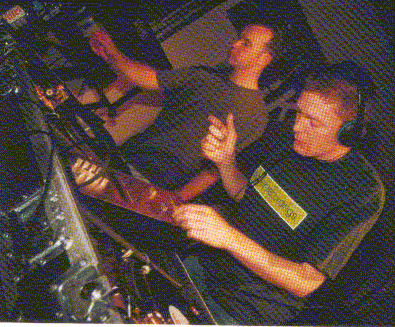March, 1999REPORTAGE / By TI LIAN LINWhy Girls Are Saying Yes To Ecstasycontinued... Among Malaysian college students, ecstasy is the drug most frequently encountered apart from cannabis, with girls trying it earlier than boys. What's the problem? "Girls are so much weaker," complains Dr Mustapha Ali, a government-hired toxicologist who tests blood samples for traces of illicit substances. "Their minds are too easily influenced, and because their psychological determination is poor, they cannot resist the effects of ecstasy as well as boys." The scary thing is that no one knows why young people, especially girls, would want to take ecstasy despite having the worst fears about brain damage. Patented by UK pharmacologists in 1913, the pill was originally meant as an appetite suppressant, and rejected for that purpose. Then a few years down the road, it became a drug that marriages back on track, but was shelved when side effects included severe depression for couples waking up the next day. Little is know how Gen-Xers stumbled upon the drug as a recreational habit, and how local youngsters are currently tapping the black market for supply. The missing link is probably underground music -- colloquially known as rave -- which has played a part in encouraging the widespread use of ecstasy in this country. Unlike musical genres like pop, funk and plain old disco, rave is an absorbing experience tattooed with psychedelic rhythmns and infectious beats. For loopy urbanites it's is the latest trend, and their underground parties can attract up to hundreds of devotees during weekend all-nighters. Jennie Luo's case is no different from scores of girls who went before her. She too came out of a rave party, which was why doctors were sosure that her manic actions were fueled by a designer drug.
Asked to elaborate on the emotional yardstick on taking E, Houghton describes: "Even if you poured boiling jam down the back of my neck, set fire to my trousers, defecated on the back seat of my car, and forced me to stare at the largest lady in the house I couldn't be more oblivious." The young man who introduces himself to the local rave crowds as DJ Sneaky reveals that he didn't, however, pack a personal cache of pills this time, because he's here to work and apparently "when yo get on top of the world you can't concentrate on mixing yor music." Such deliberations are supported by local ravers such as Jennie Luo and her bunch of intense, thrill-seeking friends. Ecstasy is glorious; it erases the pressures of work and study, banishes petty grudges and animosities. Users report feeling a friendly buzzing sensation that's affectionate and cuddly, yet sexless. But even half a dose is enough to tip first-time users off the cliff. A single pill of 100mg can take up to 8 hours to wear off, and during that time users are in incomplete control of their bodies and their feelings. With music, they quiver like puppets on elastic. "First-timers don't know the proper dosage. Moreover, they trust pushers who could be selling them impure versions, and they think buying an E puts them among the elite," he says. Apparently girls from well-to-do families succumb to this snooty tactic more than anything else. A pill is comparatively expensive (RM100-200 a hit) and you'd want to have a comfortable upbringing to spend any amount of money on this. What's offensive is that local youngsters embrace ecstasy as a class standard, an exclusive badge of wealth that speaks bigger and louder than any palm-sized phone or spiffy tech-gear. A typical ecstasy group, according to one self-acclaimed popper, is where everyone speaks English and has epxerienced a holiday abroad. "All my ecstasy patients come from wealthy families," Hussain says, adding that these prominent families are petrified by the threat of scandal. "Sometimes these rich girls say 'please don't call my father' and we never do. Our policy is to always ask for permission to call. Ultimately, it's the parent-child relationship that's going to bear the marks of this near-death psychosis. And we don't want repeat cases." It sounds as if the Professor blames family rifts for ecstasy intake, but he's aiming to drive home a bigger point. "Drugs are still an ugly thing in this country, and many rich and respectable families will not deal it the amount of understanding it deserves." Girls like Jennie Luo will never know if she will fully recover from what doctors have coined "brain damage by amphetamine stimulant". The permanent results will take time, and heaps of divine blessings. But she knows how lucky she is to have survived at all. "Last night gave me the biggest fright of my life," Jennie says rigidly the following morning, propped up in her deluxe hospital bed and clenching a Get Well card from a boyfriend. Her finely-coiffed mother, embarrassed by the interview and anxious to get going, quietly nods and slips out the door. She doen't even wait to say goodbye. |
Email author | Other articles by me
Sign up | Having problems with this site?
Copyright 1998-2000 Asiapura
 Manchester-born Simon Houghton, 23, a spin maestro who rubs records at some of Kuala Lumpur's hippiest underground joints, disputes the connection. He believes that designer drugs are giving music a bad rap. He goes: "I can't say if it kills the ladies, but I know most people enjoy rave even when they're not on drugs."
Manchester-born Simon Houghton, 23, a spin maestro who rubs records at some of Kuala Lumpur's hippiest underground joints, disputes the connection. He believes that designer drugs are giving music a bad rap. He goes: "I can't say if it kills the ladies, but I know most people enjoy rave even when they're not on drugs."